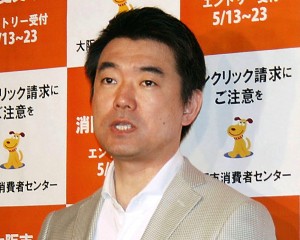Fil-Am vet hits invite to Osaka mayor

In this May 13, 2013, photo, Osaka Mayor Toru Hashimoto answers reporters’ questions at the Osaka city office in Osaka, western Japan. Osaka’s outspoken mayor has said the system in which Asian women were forced to become wartime prostitutes before and during World War II was necessary to “maintain discipline” in the Japanese military. AP PHOTO/KYODO NEWS
LOS ANGELES—With wartime atrocities still vivid in his mind, World War II veteran Franco Arcebal finds himself fighting another battle. He wants the mayor of San Francisco to withdraw his invitation to Osaka Mayor Toru Hashimoto to visit the city.
Hashimoto recently enraged Asian-American communities here for justifying Japan’s wartime practice of forcing hundreds of thousands of Asian women—including Filipinos—into prostitution for its military.
In a letter to San Francisco Mayor Edwin Lee, Arcebal, 89, lambasted Hashimoto’s “unrepentant position… justifying [the] blatant and forcible use of innocent and defenseless women in occupied territory.”
He said the Osaka mayor did not deserve the honor of an official visit to the United States.
“I am personally privy to the abduction of many beautiful young girls from our high school by military officers in my hometown in the Philippines,” said Arcebal, who lives in Los Angeles. “I could not stomach this forcible servitude of those innocent girls… [and] now the justification of an unrepentant leader in the person of Mayor Hashimoto.”
Article continues after this advertisementBecame a guerrilla
Article continues after this advertisementHe said the abduction of young women in his hometown was one of the reasons he became a guerrilla.
Arcebal is one of many Filipino World War II veterans protesting the visit to San Francisco of Hashimoto on June 11, the eve of Philippine Independence Day.
Members of the Los Angeles-based Justice for Filipino American Veterans (JFAV) also wrote Mayor Lee, denouncing what they described as Hashimoto’s historical revisionism and his “rationale that this forcible servitude… is justified in time of war.”
Historians say that up to 200,000 women were forced to provide sex for Japanese soldiers in military brothels.
“[Hashimoto’s visit] would be an affront and insult to the dignity of those who served during World War II and all they stand for,” said the letter signed by Arturo Garcia, JFAV national coordinator.
Commissioner Rudy Asercion of the San Francisco-based American Legion Veterans War Memorial Commission has launched a social media campaign opposing the visit, calling on the public to urge Mayor Lee to withdraw his invitation to Hashimoto.
Hashimoto, who is also coleader of a conservative nationalist party, has said that the use of so-called comfort women in brothels during World War II was necessary to maintain military discipline and give soldiers relief.
US troops, too
He also angered the United States by suggesting that American troops based in southern Japan should patronize legal adult entertainment establishments as a way to reduce sex crimes there.
His comments came amid concerns over what some had described as a rightward drift in Japanese politics under Prime Minister Shinzo Abe.
Before taking office, Abe advocated revising a 1993 statement by then Chief Cabinet Secretary Yohei Kono expressing remorse for the suffering inflicted on sexual slaves by Japanese troops.
The Philippine government has reiterated the importance of adhering to the language and tone of the Kono Statement of 1993 and of former Japanese Prime Minister Junichiro Koizumi’s 2002 letter to Filipino comfort women.
In his letter, Koizumi extended his “most sincere apologies and remorse” to the victims and said “we must not evade the weight of the past, nor should we evade our responsibilities for the future.”